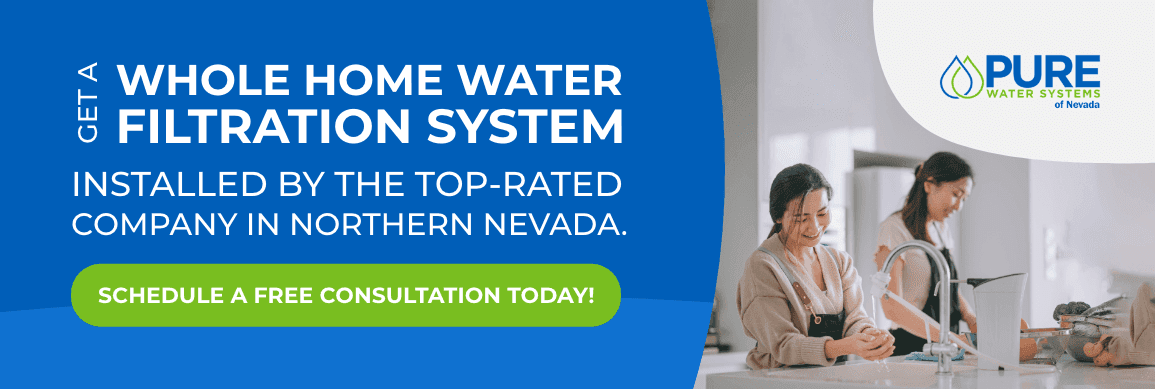We are often asked, “Does my fridge filter really do anything?” The short answer is yes. Fridge filters vary greatly between brands and models of fridges, but the vast majority utilize Granular Activated Carbon (GAC) to remove chlorine, organic matter, and some odors and gasses from your water. GAC is a catch-all of sorts when it comes to water filtration, so it may or may not remove other contaminants that it is not specifically designed for if those contaminants are bound to organic matter or other particulates that will ‘stick’ to carbon.
Another question people ask is, “When do I change my fridge filter? Is the service light accurate?” In short, it depends on the filter and incoming water quality. A common misconception is that the fridge alarm is somehow measuring the water quality and knows when the filter stops working. In reality it is just a flow meter that says you need to replace the filter every (hypothetically) 100 gallons, no matter what the incoming water quality is. Fridge filters will stop filtering long before they ever plug up because they rely on the adsorption of chlorine to improve taste rather than actually removing physical particulates. That being said, the filter alarm is definitely set way lower than the filter’s actual capacity, and I would say you’re good for at least 125% of the gallons that the fridge capacity is set for. The exception to that rule are the models with tiny little filters in them. On some of them, when you cut them open you find maybe 1.5 tablespoons of carbon which is hardly anything and the fridge capacity of 100 gallons is probably pretty accurate.
Fridge filters are designed for a majority of municipal water sources that are regulated by the Safe Drinking Water Act (SDWA) and are being monitored regularly for low-level contaminants that pose a health risk. The intent of the filters is to remove the chlorine that municipalities use to disinfect the water supplies. Chlorine can give the water an off taste and smell, as well as create disinfection byproducts (DBPs) when chlorine reacts with organic matter. These DBPs pose a significant health risk in drinking water and are known carcinogens. Fridge filters typically do a mediocre job of removing DBPs.
Learn How a Water Conditioner Can Save You Over $4,500 a Year
There are two common scenarios where we upgrade people’s drinking water from the fridge filter.
The filter is not sufficient for the incoming water quality.
There are many water sources for which a fridge filter is totally sufficient. If you just need to remove a little chlorine and get some better-tasting water, the fridge filter is a great option. However, we encounter water in Northern Nevada that is way beyond what a fridge filter can handle. Reno city water for example has DBPs that are just below the legal limit. The limit for trihalomethanes (THMs) is 80ppb (parts per billion) and Reno’s water tested at 74ppb according to the 2017 consumer confidence report. The limit for Haloacetic acids is 60ppb and Reno tested at 57ppb. Contaminants don’t magically become safe because they’re 3ppb below the legal limit, and that amount of DBPs will blow right through most fridge filters. The legal limit for arsenic is 10 ppb and Reno city water tested at 14.7 ppb which is technically failing, but not in violation on a weighted average. Then there are the municipalities like Lyon county water in Dayton, NV or the City of Fernley water that struggle to keep contaminants like Arsenic, Lead, and Coliform below legal limits. Dayton’s water peaked at 10 ppb of arsenic in 2016, which is the legal limit and actually tested above the limit of 15 ppb on lead in 2016 at 18ppb. It goes without saying that your fridge filter isn’t going to cut it in those areas.
Private wells often test high in heavy metals, nitrates and other contaminants that a fridge filter won’t remove. You should always test your private well through a certified lab before drinking the water.
When your drinking water standards are higher than the EPA drinking water standards.
If you offer most people a glass of water that has uranium in it and one that doesn’t, they will choose the one without uranium regardless of what the uranium level is. For this reason, most people recognize the benefit in using filtration that is better than what your fridge comes with. The water in Dayton, NV tests as high as 20 ppb for cyanide. The legal limit is 200 ppb so you tell yourself that it’s a safe amount, but as you’re drinking the water from your fridge filter you’re thinking, “Cyanide is cyanide at any level….I’m drinking freaking cyanide right now, I should probably call Pure Water Systems and get a better filter!”


